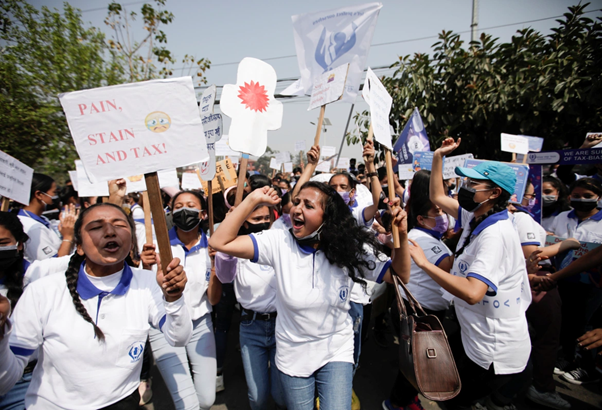The 2021 International Women’s Day (IWD) was marked with protests by working-class women across the globe. Thousands of women took to the streets in scores of cities and towns in all global regions of the world.
They had a range of demands covering themes such as: ending gender-based violence, defence of reproductive rights as fundamental human rights, stopping genocides (e.g., of the Uyghur Muslims in China), and for social equality. This shows the interconnectedness of patriarchy, class exploitation and oppression of poor people. Our struggle to end these evils must thus be united and ceaseless until we win.
Nigeria was not left out of this wave of IWD demonstrations. Women from affiliates of the Coalition for Revolution (CORE) organised a “Walk Against Hunger” from Ikeja to the Maryland Roundabout. Women also staged a protest in the Federal Capital Territory, Abuja to protest hardship, hunger and insecurity in the country. They demanded the immediate resignation of Major-General Muhammadu Buhari (retd.), for gross incompetence.
While the women marked IWD in its true spirit of struggle, the state tried to reduce the day to one of celebrating a few capitalist women who have risen in the ranks of the bosses. The president declared that he was “proud of our women” whom he said, “have shown by dint of hard work and capacity that they can perform creditably if given the opportunity at home and on the global stage.”
He was speaking here about women such as Ngozi Okonjo-Iweala, Director General of the World Trade Organization; Amina Mohammed, Deputy Secretary General of the United Nations; and Zainab Shamsuna Ahmed, the federal minister of finance.
Several state governors also said nice things about women, inclusion, and sustainable development. Abdulrahman Abdulrazaq, the Kwara state governor for example declared that women would be given voice in his government. Rotimi Akeredolu, the Ondo state governor urged women in leadership positions to keep on playing important roles in the COVID-19 pandemic response, while Godwin Obaseki, Edo state governor launched a N1bn fund for widows.
The national assembly also promised constitutional amendments to ensure gender parity. Provisions in laws such as the Federal Character Act, Police Act, Labour Act and Electoral Act which infringe on women’s rights will be expunged, according to senators.
As revolutionary activists we realise and must defend the struggle for women’s liberation. This will be won through struggle and not some genteel declarations by those in government, who are clearly part of the problem.
Thomas Sankara put this succinctly when he said:
“Comrades, there is no true social revolution without the liberation of women. May my eyes never see, and my feet never take me to a society where half the people are held in silence. I hear the roar of women’s silence. I sense the rumble of their storm and feel the fury of their revolt.”
The roots of the International Women’s Day are in the soil of such struggle for women’s liberation as a distinct and at the same time integral element of the struggle for socialist revolution. As we pointed out in the March-April 2016 edition of Socialist Worker: “the origins of this day can be found in working class women’s struggle as socialist activists”.
The bosses are mean, but at the same time quite clever. They always try to appropriate days of struggle and tame them into forums of collaborative, peaceful celebrations, and empty talk. Even May Day, when workers across the world still take to the streets to protest, has been reduced to a ritual of march pasts of workers before labour leaders and government officials, in Nigeria.
In response to the deepening systemic crisis of capitalism which has resulted in increasing hardships for the poor masses, resistance has been on the rise across the world. Working-class people, youths and women are no longer listening to the taming whistles of the bosses. Since the January 2017 Women’s March which gave birth to the #MeToo stand, women have redoubled efforts to commemorating the IWD appropriately: with struggle!
Patriarchy or the domination of women in different ways, is an integrative element of class-based societies. The exploitation and oppression of women helps to sustain the general exploitation of poor working-class people.
There are activists who thus argue that we should not give priority to the struggle for women’s liberation. This is a wrong position to take, just as the position which the bosses want us to take that the rise of a few rich and powerful women in government or business is the same thing as progress towards women’s liberation.
There are distinct concerns of women which must be accorded the importance they deserve in our struggle as a whole. It is also not given that once we defeat the capitalists everything will simply fall in place. This is an illusion. The struggle, and particularly so that for women’s rights as fundamental human rights and not just as tokenist concessions, must continue, until they are fully realised.
We will not change the system with just a few reforms here and there. System change can be won only with revolution. But this does not mean that we do not fight for and defend reforms as part of the broader struggle for revolutionary overthrow of capitalism. This general approach must also be applied to the struggle for women’s liberation.
We need to fight for laws and policies that empower the mass of women. The rise of a few rich women like Ngozi Okonjo-Iweala and Zainab Shamsuna Ahmed in government or the likes of Folorunso Alakija as a billionaire might appear chic. But these have little or no impact on the lives of millions of working-class women, just as Kamala Harris becoming the first vice president of the United States is not a victory for all women as we are made to believe.
We still remember that Margaret Thatcher promoted policies that had adverse effects on working-class women and families. These included stopping the giving of milk at schools, free of charge, to pupils under eleven years. That is why she was called “Thatcher the milk snatcher”.
Angela Merkel’s 15-year plus stay as Chancellor of Germany also did not result in any advantage for poor working women. And the list goes on and on.

As women who took to the streets on IWD in Nigeria and several parts of the world show, along with the women-specific demands which we must make, class-based issues such as hunger and hardships are also women issues. Women bear the greater burden of poverty. And that is why women liberation is an essential part of the working-class struggle for socialist revolution.
In a related development to the IWD, Nigeria Labour Congress (NLC) organised its 5th National Gender Conference (NGC) on 9th March. The NLC National Women Commission was reconstituted at the NGC, with Comrade Salamatu Aliu of the Nigeria Union of Teachers (NUT) elected as Chairperson.
SWL seizes this opportunity to congratulate the newly elected NWC leaders and urges them to take up the struggle for women’s rights with fervour, in the spirit of working-class women whose tireless fight brought about the IWD.
“We must never forget that IWD emerged as and from the heat of defiance, by working class women, with a socialist agenda for the revolutionary transformation of society. Working class women and men united cannot be defeated!”
by Wunmi AWOLOSOTU









